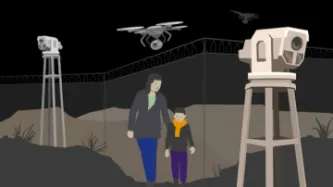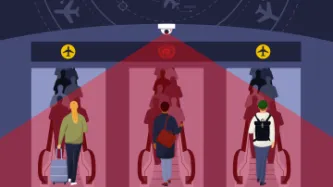Advanced Search
Content Type: Examples
Westminster Group PLC has ratified a ten-year, multi-million-pound contract to supply ground security operations and advanced detection, surveillance, and screening equipment, as well as maintenance, training, and support at one domestic and four international airports in the Democratic Republic of the Congo (DRC). Under the managed services model, which Westminster has deployed elsewhere in Africa, revenues will be driven by embarking passenger numbers and funded by a fee per passenger…
Content Type: Examples
As part of an agreement worth up to $20.8 million, Teledyne FLIR Defense will deliver ultra long-range multi-spectral imaging surveillance systems, or Star SAFIRE 380-HLD, to the Japan Maritime Defense Force, which will integrate them into the licenced Japan-based production version of the Sikorsky SH-60 helicopter. The system can operate continuously in all weather conditions and can transmit both thermal and visual imagery in high definition to those who are operating it. https://www.…
Content Type: Examples
The Swedish Defence Materiel Administration has awarded Saab a $245 million contract to provide the Swedish air force with a third GlobalEye surveillance aircraft and other services like those already in use in UAE. The contract runs until 2029. The air force is accelerating the schedule for introducing locally-designated assets after donating its current two Erieye radar-equipped Saab 340 early warning and control aircraft to Ukraine. https://www.flightglobal.com/defence/sweden-signs-…
Content Type: Examples
The US Air Force will give Capella Space Corp $15 million in funding to improve and scale its synthetic aperture radar to deliver enhanced resolution imagery. Capella also supplies technology to the National Geospatial Intelligence Agency, National Reconnaissance Office, US Navy, US Space Force, and NASA.https://www.capellaspace.com/press-releases/capella-space-awarded-a-15m-contract-with-the-u-s-air-forcePublication: Capella SpaceWriter: Capella Space
Content Type: Examples
It has been announced that the California Highway Patrol has signed a $1.6 million (for the first year) contract with Flock Safety to install 480 high-tech cameras on Oakland's streets and freeways to identify licence plates and catalogue passing vehicles by make, model, colour, and other features. An official asserted that footage obtained from the cameras would be deleted after 28 days and not shared with third parties or other states that might use the information to track people seeking or…
Content Type: Examples
The UK Home Office has renewed its 3 year long contract with Tekever to provide maritime surveillance as a service across the English Channel using its AR5 and AR3 model drones, also known as Unmanned Aerial Vehicles (UAVs). The AR5 system is a UAV that is intended to conduct surveillance missions and can fly for more than 20 hours and carry sensors such as maritime radar and day and night cameras. It will be used to detect, recognise, track, and identify potentially illegal vessels and…
Content Type: Examples
Under a new contract, Planet Labs PBC will provide the NATO Communications and Information Agency's Alliance Persistent Surveillance from Space programme (APSS) with satellite data to aid in detailed tracking and analysis of foreign military activities and fill intelligence gaps. APSS is a multi-year, multinational project to use space to collect data on any location at any time and enhance NATO's engagement with future technologies, for example Artificial Intelligence (AI) and cloud…
Content Type: Examples
The US Department of Defense has awarded a contract worth almost $250 million to Anduril Industries for more than 500 Roadrunner-Ms as well as Pulsar electronic warfare capabilities, with AI-enabled systems, to counter the threat of attacks using unmanned aerial systems in “priority regions”. Anduril has won nearly $350 million in contracts since these technologies were publicly launched.https://www.designdevelopmenttoday.com/industries/military/news/22922589/anduril-awarded-250-million-air-…
Content Type: Examples
Under a new contract effective from October 2024 to December 2025, PureTech Systems, which specialises in geospatial AI-boosted video analytics, will deploy its command-and-control software in 22,600 square kilometers of the US border. The software will integrate the sensors attached to existing surveillance towers while retaining the interface already familiar to border agents.https://www.prnewswire.com/news-releases/puretech-systems-inc-awarded-major-command-and-control-contract-by-us-…
Content Type: Advocacy
In our submission, we argue that the EDPB's opinion must take a firm approach to prevent peoples' rights being undermined by AI. We focus on the following issues in particular: The fundamentally general nature of AI models creates problems for the legitimate interest test;The risks of an overly permissive approach to the legitimate interests test;Web scraping as ‘invisible processing’ and the consequent need for transparency;Innovative technology and people’s fundamental rights;The (in)…
Content Type: Long Read
18th December is International Migrants Day, a day to recognize both the contributions and continued struggles of migrants across the world.Migrants continue to face an increased level of human rights violations through hostile immigration policies and practices. At borders and beyond, their fundamental human rights and dignity are being violated through old and new technologies. These systems in place reinforce the dehumanising rhetoric of migrants, who are merely seeking asylum and a better…
Content Type: Examples
In a novel class action suit, Derek Mobley, who is Black and over 40, has claimed he was passed over for more than 100 jobs at companies that use Workday's AI recruitment software to select candidates for interviews, alleging that it uses data from companies' existing workforce without accounting for historical bias. Workday has filed a motion to dismiss the case, arguing that it is not covered by federal laws barring discrimination on the basis of race, age, or disability because it is neither…
Content Type: Examples
Over the years, Urban Company, which in 2014 offered women economic independence in India, a country that has very low female participation in the workforce, has increasingly removed flexibility and autonomy for its workers while raising the cost of getting started as a worker on the app to the equivalent of two months' salary. Urban Company disputes this characterisation. In June 2024, dozens of women workers began a protest outside the company's office in Bengaluru, calling the company a…
Content Type: Examples
Almost half of all job seekers are using AI tools such as ChatGPT and Gemini to help them write CVs and cover letters and complete assessments, flooding employers and recruiters with applications in an already-tight market. Managers have said they can spot giveaways that applicants used AI, such as US-style grammar and bland, impersonal language. Those whose AI-padded applications perform best are those who have paid for ChatGPT - overwhelmingly from higher socio-economic backgrounds, male, and…
Content Type: Examples
Amazon is calling for the dismissal of a complaint issued by the National Labor Relations Board after two warehouse workers in the US state of Georgia claimed they faced retaliation, surveillance, and questioning after they led employee complaints about policy changes. Amazon, in common with other companies such as Trader Joe's and Starbucks, is claiming that following a recent US Supreme Court decision ending the "Chevron deference" principle, the NLRB's complaint violates the US constitution…
Content Type: Examples
Uber has been fined €290 million in the Netherlands for sending European taxi drivers' data to the US without appropriate safeguards in violation of the EU's GDPR. The Dutch data protection authority, which adjudicated a complaint originally filed in France on behalf of more than 170 drivers there, says Uber has since stopped the practice. Uber contests this decision; the appeal is expected to take four years. Earlier in 2024, the authority also fined Uber €10 million for infringing privacy…
Content Type: Examples
Uber and Bolt users in South Africa and Nigeria have been booking hoax rides in each other's country and pranking gig workers to express their anger after the beauty pageant contestant Chidimma Adetshina controversially pulled out of the Miss South Africa pageant and then agreed to appear in a similar contest in Nigeria, fuelling tension between the two countries. Bolt has responded by restricting inter-country ride requests and blocked the users in question. Uber says it is investigating.Read…
Content Type: Examples
After Uber refused requests to adjust prices following a rise in the cost of fuel, Kenya's Organisation of Online Drivers union of about 15,000 began circulating its own chart listing fares about 50% higher than Uber's official prices. Members using it are prioritising customers who pay by cash or M-Pesa and turn down customers who want to pay using Uber's app. As the rate card has become more familiar, customers are showing less resistance to these new driver-set prices. Uber says the…
Content Type: Examples
More than 1,000 motorcycle taxi drivers in Indonesia for the ride-sharing company GoTo and the ride-hailing and food delivery company Grab have begun a strike. The drivers are calling on the government to grant them a larger percentage of trip revenues and improved employment status. Together, Grab and GoTo have a combined market cap of $18 billion; both call drivers "partners" to avoid legal employment obligations such as minimum wages, limited hours, and social security insurance.Read the…
Content Type: Examples
About 30 Brazilian delivery drivers for Deliveroo and Uber Eats in Bristol, UK have resorted to living in encampments due to rapidly rising rents and low, if not below, minimum wage. Gig workers have reported increasingly harsh living conditions and long hours with low pay, leading to worsening mental health problems in the encampment. Meanwhile, Deliveroo and Uber Eats have both recently declared profits, and Deliveroo has even recently defeated a seven-year legal effort to gain workers'…
Content Type: Guide step
Depending on where in the world you are visiting from, websites may seek consent as one way to justify their collection of data about you. This has become general practise across the web, and the typical way to ask for user consent is via banners that pop up first thing when the webpage loads. Often these banners will make use of design elements and user interfaces aiming to mislead or influence you in giving away consent to collect and process your data - these are called Dark Patterns and are…
Content Type: Report
In this new briefing, we identify the most significant concerns on the UN Countering Terrorist Travel Programme (CTTP), and put forward a range of recommendations to mitigate some of the human rights risks associated with the surveillance of travellers. We based our briefing on publicly available information and our own research, outlining the purposes and activities of this UN programme. We shared a draft of this briefing with the United Nations Office of Counter- Terrorism (OCT), which…
Content Type: Long Read
In this new briefing, we identify the most significant concerns on the UN Countering Terrorist Travel Programme (CTTP), and put forward a range of recommendations to mitigate some of the human rights risks associated with the surveillance of travellers. We based our briefing on publicly available information and our own research, outlining the purposes and activities of this UN programme. We shared a draft of this briefing with the United Nations Office of Counter- Terrorism (OCT), which…
Content Type: Advocacy
On the 13 November 2024 a debate took place in the UK parliament on the police’s use of facial recognition technology (FRT) for the first time, despite facial recognition being used as far back as 2017.The issue was debated by 13 members of parliament (MPs) representative of a range of political parties, as well as the Minister for Fire, Policing and Crime Prevention. Throughout the debate several MPs raised concerns around privacy, surveillance, issues of facial recognition disproportionately…
Content Type: News & Analysis
The UK government has published a £20 million procurement for tech companies to provide live facial recognition technology (FRT) to police forces across the UK.Through BlueLight Commercial, a non-profit commercial consortium representing police and other emergency services, the government has issued a tender notice to establish a national multi-supplier framework for the provision of live FRT. The Scope of the framework is for “real-time deployment of facial recognition technology, which…
Content Type: Advocacy
In the wake of Privacy International’s (PI) campaign against the unfettered use of Facial Recognition Technology in the UK, MPs gave inadequate responses to concerns raised by members of the public about the roll-out of this pernicious mass-surveillance technology in public spaces. Their responses also sidestep calls on them to take action.The UK is sleepwalking towards the end of privacy in public. The spread of insidious Facial Recognition Technology (FRT) in public spaces across the country…
Content Type: Long Read
IntroductionIn early October this year, Google announced its AI Overviews would now have ads. AI companies have been exploring ways to monetise their AI tools to compensate for their eye watering costs, and advertising seems to be a part of many of these plans. Microsoft have even rolled out an entire Advertising API for its AI chat tools.As AI becomes a focal point of consumer tech, the next host of the AdTech expansion regime could well be the most popular of these AI tools: AI chatbots.…
Content Type: Advocacy
The rapid expansion of educational technologies (EdTech) has introduced serious concerns about human rights protection in educational spaces. This briefing explores the impact of facial recognition technology (FRT) and heightened surveillance in these settings, highlighting many complex and multifaceted issues that demand careful consideration from a human rights perspective. From the erosion of privacy and the securitisation of educational spaces - that undermines the learning and growth…









